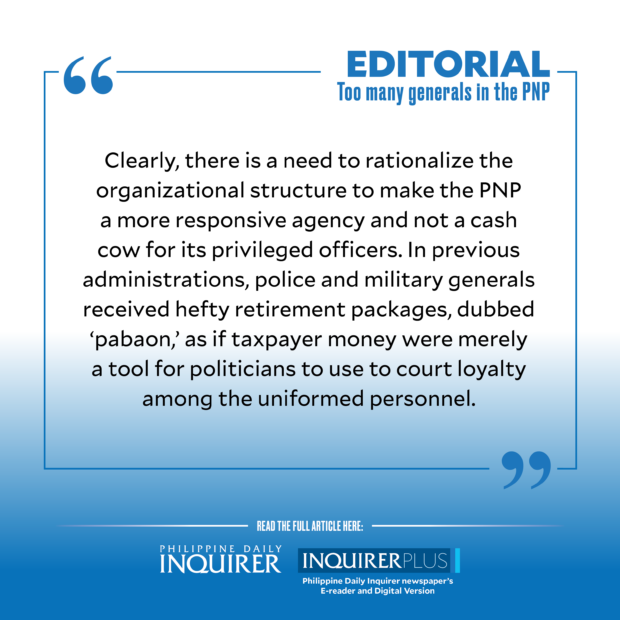
On Sept. 20, according to reports, the President administered the oath-taking of 57 officers—four police lieutenant generals, 10 police major generals, and 43 police brigadier generals. A week later on Sept. 27, the second batch was sworn in, composed of 55 officers: one police lieutenant general, seven police major generals, and 47 police brigadier generals. A total of 119 were reportedly promoted to star-rank, with 113 able to attend the ceremonies in Malacañang.
The flurry of star-rank promotions proceeded despite a letter from the Department of Budget and Management (DBM) last year questioning the rank distribution in the PNP. In a letter to Abalos dated Oct. 12, 2022, the DBM noted that excess rank positions reached 66,203 as of June 30 which amounted to a yearly base pay of P26.7 billion. The DBM found 35 excess flag positions with eight lieutenant generals against DBM’s approved positions of only three; 17 major generals instead of 11, and 110 brigadier generals against only 86 approved positions. There were also thousands of excess positions for colonels, lieutenant colonels, majors, captains, staff sergeants, and corporals.
In contrast, the DBM and the Department of the Interior and Local Governments (DILG) found at least 66,958 vacant positions for lower-rank patrolmen and patrolwomen, and only 62,968 PNP personnel despite the DBM-approved distribution of 129,926 positions. These personnel account for the bulk of the police force on the ground, and for the police visibility necessary to deter the commission of crimes.
Because of the DBM’s findings, Abalos asked the legal opinion of the Office of the President on the excessive number of police generals in the absence of a law allowing the increase in the number of commissioned officers in the police force.
According to the DBM, it is the legislative branch that can create such positions except for offices created by the Constitution. It noted that existing laws—Republic Act No. 6975 (DILG Act of 1190), and RA 8551 (PNP Reform and Organization Act of 1998)—do not provide for the increase in the number of flag positions.
Apparently, Malacañang went ahead with the promotion of so many police generals despite the DBM letter and the absence of a law authorizing those excess positions.
Currently, the proposed PNP reform bill, which includes the creation of more flag positions and key commands in the police force, has been approved in the House and is pending final approval in the Senate. Speaker Martin Romualdez said House Bill No. 8327, approved in August at the lower chamber, included internal reforms that would make the PNP “more responsive in dealing with its present-day challenges.” He added that this “[would] ultimately redound to the benefit of Filipinos, whom the PNP seeks to protect.”
Its counterpart, Senate Bill No. 2449, was submitted for plenary approval in the Senate last week. Its sponsor, former police chief Sen. Ronald dela Rosa pointed to provisions that would supposedly strengthen discipline and instill excellence in the police force. The bill also set police retirement age to its equivalent in the military and seeks to remove “undue influence” from local officials by transferring to the PNP the right to choose the local police chiefs. Abalos said the proposed measures would be the “first comprehensive reform of the PNP since 1998.”
The two measures however fail to address the anomaly pointed out by the DBM: the top-heavy nature of the police hierarchy. The pending bills would, in fact, justify and institutionalize the numerous flag positions that not only add constraints on the national budget but have also been shown to abet abuses in the police organization since the top-rank officers are themselves involved.
Recall how the link of several police generals to the illegal drug trade has tarnished the PNP’s image and the public’s trust, forcing Abalos to call for mass resignations early this year to flush out the rogue generals. The killing of innocent teenagers by the police in Navotas and Rizal in August also manifests the culture of impunity that prevailed during the previous administration, with police killing more than 6,000 drug suspects in the brutal Duterte drug war.
Clearly, there is a need to rationalize the organizational structure to make the PNP a more responsive agency and not a cash cow for its privileged officers. In previous administrations, police and military generals received hefty retirement packages, dubbed “pabaon,” as if taxpayer money were merely a tool for politicians to use to court loyalty among the uniformed personnel.
If the proposed PNP reform law were to live up to its name, Congress must endeavor to address the PNP’s lopsided structure while there is time.